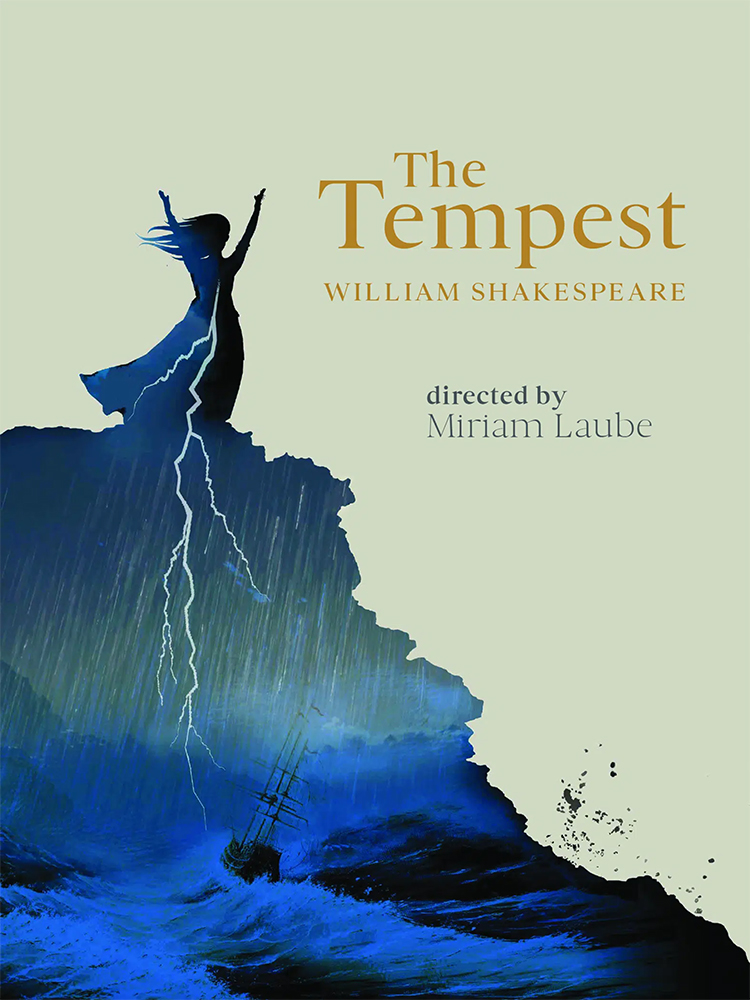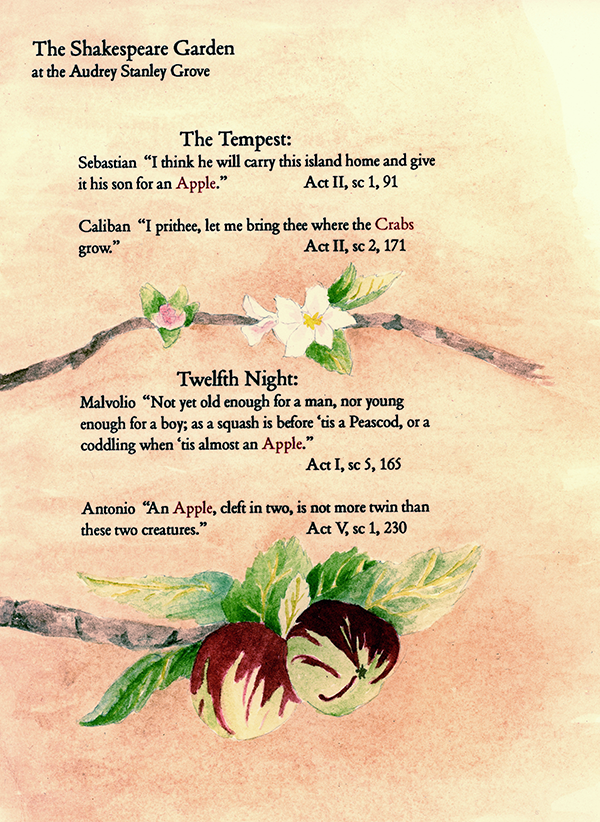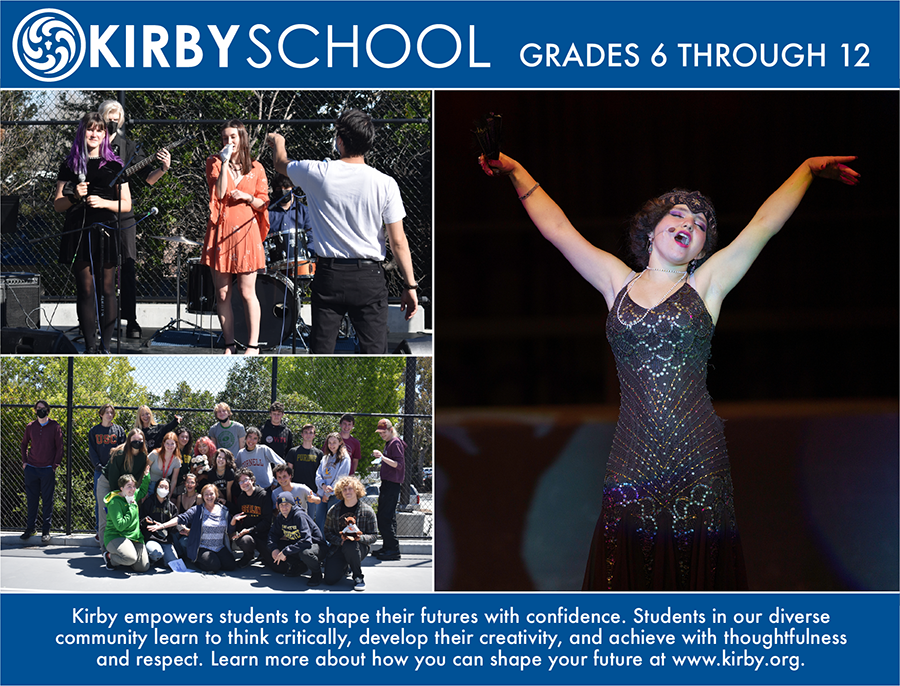
By William Shakespeare
The Tempest, by William Shakespeare directed by Miriam A. Laube.
SCS’s second Shakespeare play also begins with a shipwreck, though this is one created by design…more specifically, by the magic of Prospero’s tempest. Determined to destroy those who banished her to the island, Prospero weaves spells of illusion and enchantment with the aid of the spirit Ariel to exact her revenge. As love blossoms before her eyes, Prospero must choose between vengeance and hope. Part tale of revenge and part comedy, The Tempest is full of music, spectacle, and the magic of art.
Benefactors
Alan Daniel and Kathy Kenan
Audrey E. Stanley
Executive Producers
Barnes Charitable Fund
Rae and Bill Saltzstein In Memory of Elizabeth Chempolil Laube, an ardent supporter of theater, music, and Miriam
While Prospero studied books about magic, her brother Antonio stole her dukedom, casting her and her infant daughter Miranda off to sea. They drifted ashore on an island inhabited by Ariel, a spirit who performs feats of magic at Prospero’s command, and Caliban, whom Prospero at first befriended but later forced into servitude. Now a ship approaches the island.
Musician and Co-Composer
Michal Palzewicz
Prospero
Laura Gordon*
Ariel
Jennie Greenberry*
Boatswain
Joshua Lewis
Alonso
Maggie Bofill*
Antonio
Charles Pasternak*
Gonzalo
Ward Duffy*
Sebastian
Safiya Harris*
Ferdinand
Gustavo A. Flores
Miranda
Maya Mays
Caliban
Jonathan Smoots*
Trinculo
Patty Gallagher*
Stephano (and Co-Composer)
Cedric Lamar*
Ensemble
Cassie Martin
* Denotes member of Actors’ Equity Association, the Union of Professional Actors and Stage Managers in the U.S.
Director
Miriam A. Laube
Scenic Designer
Dipu Gupta
Costume Designer
B. Modern+
Lighting Designer
Kent Dorsey+
Sound Designer / Composer
Rody Ortega+
Wigs Designer
Jessica Carter
Production Stage Manager
Claire Stark*
Head of Dramaturgy
Michael Warren
Associate Head of Dramaturgy
Sean Keilen
Dramaturg
Ashley Herum
Voice Coach
David Morden
Assistant Director / Choreographer
Eddie Lopez
Intimacy Choreographer
Noah Luce
Assistant Stage Manager
Kate Wellhofer
Assistant Costume Designer
Gillian Bong+
Stage Management Intern
Max Zamorano
Directing Intern
Chloe King
Dramaturgy Intern
Justin Hammer
++ The Director is a member of the Stage Directors’ and Choreographers’ Society, a national theatrical labor union
+ These designers are represented by United Scenic Artists, Local 829 of the International Alliance of Theatrical
Stage Employees
* Denotes member of Actors’ Equity Association, the Union of Professional Actors and Stage Managers in the U.S.
WONDER, FORGIVENESS, MAGIC and MOTHERS IN THE TEMPEST
I come to this a month after the passing of my mother. I share this with you because as artists we bring our experience with us. I sit in the darkness trying to write these notes. Why THE TEMPEST? Why now? But no words come. These days I often sit in the darkness. And I feel frozen. Frozen in silent grief.
ON WONDER
Noun: rapt attention or astonishment at something awesomely mysterious or new to one's experience (Merriam-Webster Dictionary)
Today, as I am sitting in the dark unable to sleep, I hear a morning bird, a lark, first one lark, then many, singing the dawn into existence, and I am filled with wonder. I am in awe of the resilience of the day that begins again with a song. I find myself with tears running down my face. And I am no longer frozen. Something has melted, something has moved.
And I think about the power of wonder.
And I think of this play.
We begin with Prospero, stranded in a storm of revenge. For her, the grief is loud, not silent. She is caught in anger, seeking revenge, for twelve years planning and plotting retribution. But over the course of the play… something shifts. Is it possible she receives the reflection of the wonder of humanity in her daughter’s eyes? Is it possible that wonder begins the shift? The movement towards forgiveness?
“Oh wonder!” Her daughter Miranda says. “How many goodly creatures are there here! How beauteous mankind is! O brave new world, that has such people in it.”
ON FORGIVENESS
Forgiving does not erase the bitter past. A healed memory is not a deleted memory. Instead, forgiving what we cannot forget creates a new way to remember. We change the memory of our past into a hope for our future. (Lewis B. Smedes)
I am moved that at the end of his career, after investigating ambition, hubris, inaction, and of course, love, Shakespeare came back around to wrestle with forgiveness. All four of the plays we call Romances ( WINTER’S TALE, CYMBELINE, PERICLES and the TEMPEST) examine forgiveness in one way or another. At its heart, THE TEMPEST follows Prospero’s journey from revenge to forgiveness. This forgiveness does not come easily, nor quickly, nor readily.
I am fascinated by Shakespeare’s illumination of the practice of forgiveness. That this practice takes work and effort and energy, which can free us. And one of the steps necessary for forgiveness is compassion for those who have wronged us. Shakespeare has Ariel, the spirit, the non-human character in the play whisper this human truth in this beautiful exchange with Prospero. This simple exchange always fills me with wonder.
ARIEL: Your charm so strongly works’em
That if you now beheld them, your affections
Would become tender
PROSPERO: Dost thou think so spirit?
ARIEL: Mine would. Were I human.
ON MAGIC, COMMUNITY AND ART
One cannot talk about THE TEMPEST without talking about magic. Prospero is after all a magician, a sorcerer and in female form, perhaps a witch. Prospero refers to her magic as art. In our production the magic will be created by the community on stage. We will not have lights or projections or fancy illusions. What we will have is a group of actors coming together to create something beyond themselves. After two years in isolation, a group of actors coming together to conjure “sounds and sweet airs” is perhaps greatest magic of all.
SO WHY THE TEMPEST? WHY NOW?
Because Shakespeare’s magic is his words. And these words exist in this play.
Though with their high wrongs I am struck to the quick,
Yet with my nobler reason ‘gainst my fury
Do I take part.
We need these words. Yesterday. Today. And Always.
I am interested, at this moment in our history, with our polarized country and war-torn world, in what moves us forward. I am interested in investigating and illuminating, what it takes, and what it costs, to let go of the betrayals, the hatreds, the fears that bind us - and what it takes and costs to have the courage to return to wonder at the human spirit in order to move through the storm into the dawn beyond… and begin again.
And finally…ON MOTHERS AND DAUGHTERS
I want to thank Mike Ryan and Laura Gordon for inviting me on this journey. I joined this production knowing that Prospero would be played by Laura Gordon. How lucky for me. How excited I am to explore this play with Laura and this incredible company of actors. And how wonderful to be able to investigate the fierce love between mothers and daughters.
I dedicate this to my mother. She who taught me about the courage and grace it takes to forgive. She who taught me to wonder.
Ashley Herum
The Tempest’s first recorded performance took place in the presence of King James on All Saint’s Day, 1611. Although not Shakespeare’s final collaborative work, The Tempest is the last play he penned as sole playwright. Like other plays that Shakespeare’s wrote around the same time, Pericles (1608), Cymbeline (1609), and The Winter’s Tale (1610), The Tempest is often classified by modern scholars as a “romance.”
As a genre of literature, the designation “romance” does not refer to romantic love, although the play does feature that between two of its characters. Instead, as a romance, the play includes such things as shipwrecks; a non-urban landscape with seemingly Golden Age qualities or potential; an adolescent who unexpectedly learns that she is of the nobility and therefore eligible to marry a king’s son; and a main character, Prospero, an overly studious magician and the deposed Duchess of Milan, whose earlier geographical wandering at sea in a broken-down boat is reflected by subsequent inner journeying toward self-discovery. The staged events of The Tempest take place in a more circumscribed setting than do most romances: an island.
The island is a microcosm where Prospero continues to indulge her over-reliance upon magic, while also attempting something she did not do while she was Duchess of Milan: govern her realm. Yet the island is not necessarily hers to govern. Caliban claims the island through descent from his now-deceased mother Sycorax, while Ariel may have the prior claim to the island; for Sycorax had encountered Ariel there and confined her inside a pine tree. Nevertheless, Prospero assumes control of everyone present upon the island, among them her fifteen-year-old daughter Miranda, as well as any new arrivals.
Such new arrivals as appear, sailing upon a ship, include the very people from Prospero’s past—her brother Antonio; Alonso, King of Naples; and the courtier Gonzalo—who had deposed her and forced her into exile. There is a suspicion that Prospero, through her magic or the force of her vindictive memory, may have compelled their ship to approach “her” island, thus allowing her to inflict a theatrical tempest upon it. Also on board are the King of Naples’ son Ferdinand, whom Prospero considers a suitable husband for Miranda; and two drunkards, with whom Caliban—who has aspired to be Miranda’s husband— plots to depose Prospero by murdering her outright. Prospero remains entrenched in vengefulness toward her transgressors, until the spirit Ariel inspires in her the wish to forgive them—and to give up magic. Even as Prospero at last frees Ariel, Ariel frees Prospero from her obsessive, anti-social practices.









